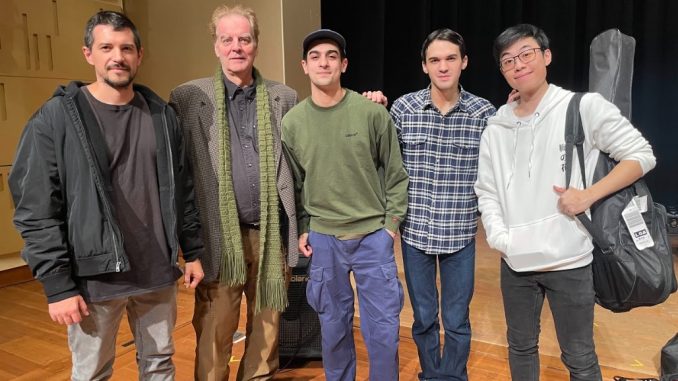
By Samia Afsar
The Conservatory of Music at Brooklyn College hosted its 32nd Biannual International Electroacoustic Music Festival this past week. Held in the Don Buchwald Theater, and under the direction of BC Professor and Director of Music Technology George Brunner, the festival spanned over the course of three days, with guest performances on Thursday, Mar. 16, an all-faculty concert on Friday, Mar. 17, and a student concert featuring original compositions created by emerging composers on Saturday, Mar. 18.
Among the Saturday performers were Gidong Kim, Ashley Ortiz, Francois DeVille, Zhi Chen, Chris Lutsker, and Paolo Lembo, presenting a cornucopia of sundry electronic music for an afternoon celebrating cutting-edge work.
“The diversity of the festival – it’s vast and brings not only different styles of music together but from different cultures and different parts of the world,” Brunner told The Vanguard following the concert. “They’re worlds apart, but they come together through the commonality of electronic music, and that is just beautiful […] that’s the thing that keeps me going with this [festival] because I love to see the variety.”
From instructing music technology and recording courses to facilitating the longest-running emerging composers concert in the country, Brunner’s presence in the music department is one that has proven to be vital to the community since he arrived at Brooklyn College over thirty years ago.
In his classes, Brunner focuses on teaching his students the fundamental concepts of music theory and recording, explaining how various instruments and equipment function without dictating or propagating a distinct style of music.
“I think the worst thing you can do is teach a style because the best you’ll get is a clone of yourself,” said Brunner. “That’s not productive for the students, it’s better to teach them as much technique as you can and guide them without affecting their own aesthetics.”
When discussing the challenges that arise from pursuing electronic music, Brunner emphasized the importance of an audience appreciating and honoring the work that is created.
“The hardest thing is reaching out to an audience,” said Brunner. “But what I have learned over the years is to provide people not interested in electronic music with a reason for them to come to a concert.”
To combat low attendance and to spark an interest in the genre, Brunner incorporates an array of the arts into the festival and other concerts, ascribing the importance of merging the arts to promote electronic musical compositions. In the past, Brunner has held concerts where musicians composed pieces based on “The Tempest” by William Shakespeare, which drew in an audience of 250. Similarly, by encompassing dance in another event titled “Tempest Fuge,” Brunner welcomed over 500 patrons.
“It’s through that kind of synergy of joining with other forces, whether they’re visual art forces or film collaborations that you are able to get it [electronic music] out to an audience,” said Brunner.
As of now, Brunner is hoping to direct an all-alumni concert for the upcoming fall 2023 semester, where he hopes to provide, but more importantly, encourage the graduates with a space to reignite passions that may have been lost in the hectic upkeep of their own lives and responsibilities.
“This is a way to say, if you still have it, compose something and come back,” said Brunner. “It’s an attempt to deal with people who had the passion at one time, but life may have forced them in another direction.”
The Conservatory of Music will be hosting its next Electroacoustic Music Festival in November of the upcoming fall semester.
